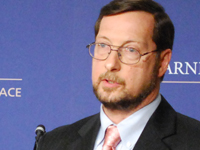Registration
Thank you!
You will receive an email confirming your registration.
IMGXYZ1217IMGZYXThe past year has ushered in tumultuous changes for both the United States and Russia, as well as, for their bilateral relationship. Alexei Arbatov joined a Carnegie Washington D.C. audience to examine the nature of these changes and to propose his views about the relationship going forward. Ambassador (Ret.) James F. Collins moderated the discussion.
Popular Views
Arbatov explained that both conservatives and liberals within the Russian foreign policy community have conflicting perspective on the future of the U.S.-Russia relationship.
Conservatives:
- U.S. foreign policy positions will remain the same and the U.S. will continue to act unilaterally.
- A great deal of U.S. foreign policy will change, resulting in better U.S. relations with nations such as India, China, and the former Soviet republics. Such a transformation will only serve as a detriment to Russia, which should do all it can to prevent this shift in U.S. policy.
Liberals:
- While U.S. foreign policy is sure to change, Russia’s will not, creating increased tension in the bilateral relationship.
- The foreign policies of both nations will change, allowing for a better relationship to evolve provided the two countries keep in mind the lessons from the 1990s. Arbatov shares this perspective.
Moving Forward
Arbatov offered several recommendations for how the West should approach Russia in order to improve relations.
In these times of economic hardship the West should not forget Russia. Instead, it should learn from its mistakes in the 1990s and engage Russia now that it again needs help.
Arbatov also urged further cooperation on a shared security agenda. NATO should recognize the CSTO (Collective Security Treaty Organization) and begin serious consultations over including Russia as a member.
The United States and NATO should cooperate more closely with Russia on Afghanistan. Arbatov cited steps Russia's efforts to facilitate supply transport for NATO forces across its territory as a “soft signal” of Russian willingness to engage. The lessons it has learned from its Afghanistan war in the 1980's could provide important experience for the current operation there.
In terms of nuclear nonproliferation, Arbatov called for both short and long-term tracks for nuclear treaty negotiations. The short time period left to re-negotiate the START treaty means that a simple agreement would need to be settled upon now. But he urged that a more creative and complex treaty should still be developed at a later date.
